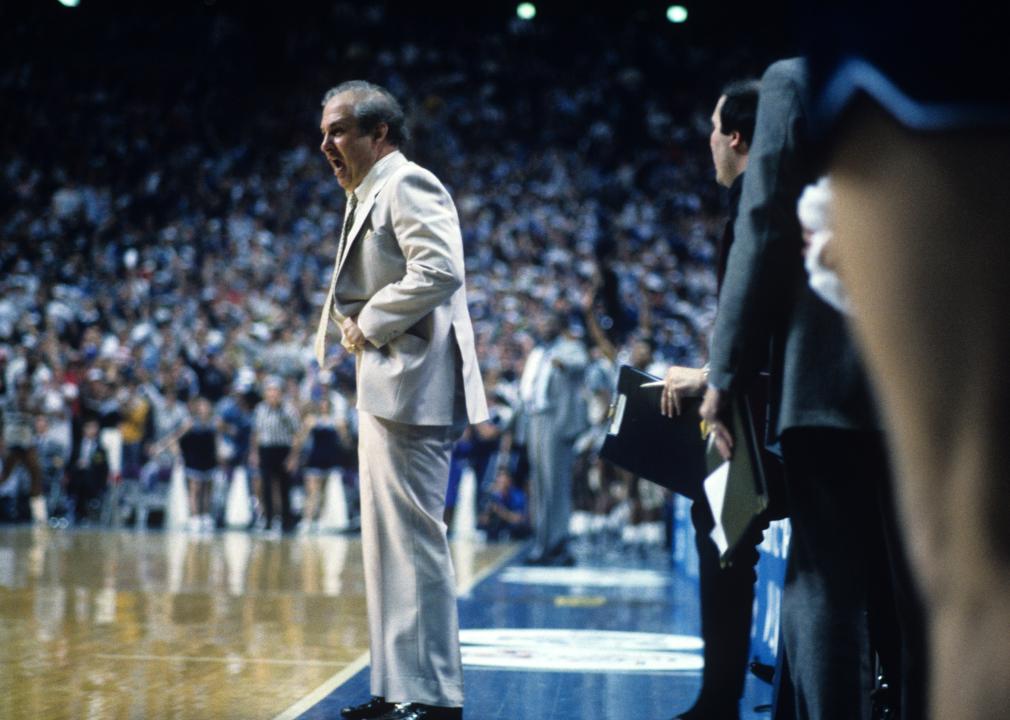Brett Wilhelm/NCAA Photos // Getty Images There’s a reason it’s called March Madness. Besides the mad enthusiasm (and heavy betting) of partisan fans, the madness of underdog teams posting upset after upset to advance as far as the Final Four or even the championship game makes for compelling theater. Who doesn’t love an underdog or, in March Madness parlance, a Cinderella? ATS.io compiled a ranking of the most surprising men’s March Madness champions since 1982 (when “March Madness” was coined) using Sports Reference data. Each team was ranked according to their lowest position in the final Associated Press poll conducted before that season’s March Madness. Ties were broken using Sports Reference’s Simple Rating System. “Blue blood” teams–the elite of the elite, including Connecticut, Duke, Kansas, Kentucky, North Carolina, and Villanova–routinely land near the top of the AP and SRS rankings. The AP poll, updated weekly, is an ordered list of 25 teams based on the opinions of sports media, while the SRS combines average point differential and strength of schedule. During March Madness, viewers relish watching blue bloods lose to unheralded teams, which are often programs with small student bodies and recruiting budgets. It happens surprisingly often, much to the delight of fans. The exception, of course, is when a blue blood alma mater loses to a Cinderella. That really makes a fan’s blue blood boil. 6 teams account for 24 of the last 41 NCAA championships ATS.io Fans and journalists revere blue blood teams because they routinely post excellent regular-season records and are almost always in the mix to win the national title. While the chart above shows the winningest men’s programs since the 1981-82 season, Indiana, Michigan State, and the University of California, Los Angeles, are also regarded as blue bloods by some because of their histories of success. As you can see, six teams account for much more than half of all the titles won in the last four-plus decades–and curiously, two are located only 10 miles apart (Duke and North Carolina). The Blue Devils (in 1991 and 1992) are the only team on this list to win back-to-back titles since 1982 (Florida also did it in 2006 and 2007), though Kentucky came within one game of a threepeat from 1996 to 1998. #5. University of Arizona, 1996-97 NCAA Photos // Getty Images – Final AP poll rank: 15 – Record: 25-9 – SRS rating: 21.66 With only two of the six leading blue bloods not on the East Coast (Kansas and Kentucky), it’s no wonder fans of those programs don’t think much of teams from the West. When the University of Arizona Wildcats clawed their way to the Sweet Sixteen in 1997, most figured they were overachievers doomed to cough up a furball. Arizona had finished just fifth in the Pac-10, but it was led by legendary coach Lute Olson and five players who went to the NBA. The fourth-seeded Cats improbably upset three #1 seeds to take the title. After an 85-82 shocker against powerhouse Kansas, they won an overtime squeaker against Providence and eliminated North Carolina. Arizona won the championship over defending champion Kentucky (who also won the following season) 84-79 in overtime, and Miles Simon was named Most Outstanding Player following his second 30-point game of the tournament. #4. North Carolina State University, 1982-83 Focus on Sport // Getty Images – Final AP poll rank: 16 – Record: 26-10 – SRS rating: 15.26 It took a furious comeback in the championship game for North Carolina State to topple Houston. The Wolfpack needed six straight points to tie it and then a dunk before the buzzer by Lorenzo Charles over future NBA superstar Hakeem Olajuwon to win it–one of the maddest moments in March Madness history. NC State nearly turned the ball over twice in the final 12 seconds, and Dereck Whittenburg was 27 feet from the hoop when he launched the desperate shot that fell short but right to a wide-open Charles, who grabbed it and stuffed it home. It was all possible only because sixth-seeded NC State had upended three other tournament opponents in one- or two-point games, including first-seeded Virginia in the regional final. Legendary coach Jim Valvano, nicknamed “Jimmy V,” was no less enthusiastic than his players and fans in a wild postgame celebration of the first Cinderella to win the tourney, the “Cardiac Pack.” #3. University of Connecticut, 2013-14
Most surprising March Madness winners of all time










